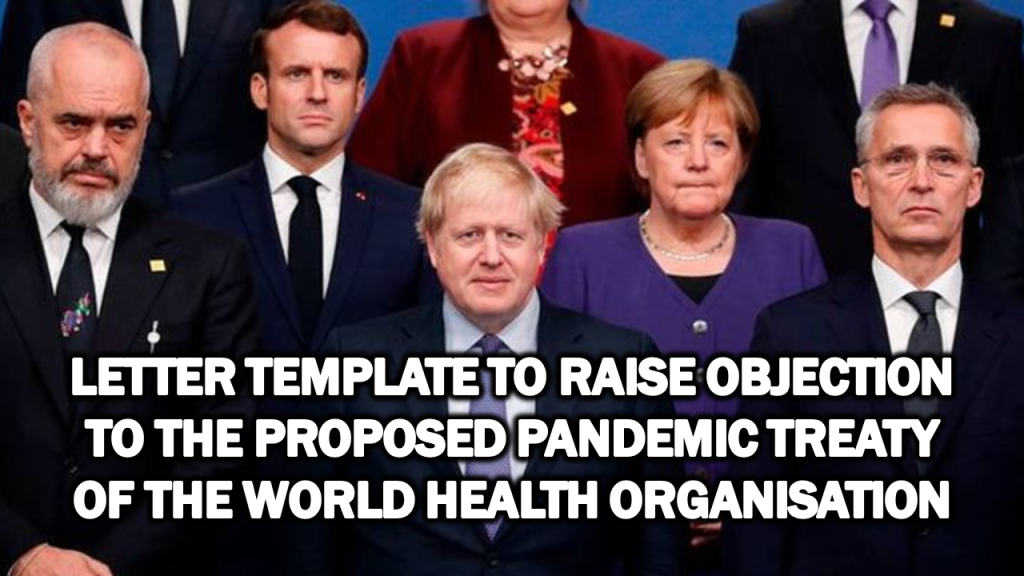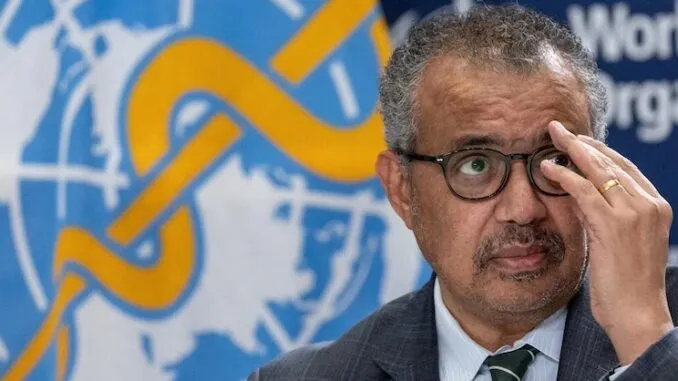-
Letter Template to Raise Objection to the Proposed Pandemic Treaty of the World Health Organisation

The proposed International Treaty on Pandemic Prevention and Preparedness builds on the growing reach of the International Health Regulations, in transferring more power to the World Health Organisation (WHO) to declare emergencies and then require countries, under treaty obligations, to follow WHO instructions.
Download the letter of objection to WHO’s pandemic treaty to send to your government representative HERE.
The WHO is a branch of the United Nations, set up in the late 1940s to support countries in managing various aspects of health. It was intended to be subject to control by member states, taking its instructions from the World Health Assembly which is made up of health ministers of member states. However, although it was originally funded by member states, it has become increasingly dependent on funding from private foundations, and corporations, particularly those heavily involved in, or invested in, the pharmaceutical industry.
In parallel with the increase in private funding, the WHO’s focus has shifted increasingly from community-based interventions to pharmaceutical-based interventions. Sister organisations tied closely to the WHO, including the Gavi Alliance and Cepi, are also concentrated almost solely on pharmaceutical approaches. Like the WHO, they are also partly funded by taxpayers through aid budgets but heavily influenced by Pharma.
WHO staff are recruited according to national quotas, technical qualifications but also personal networks. The Director-General is appointed by the vote of the health ministers, subject to international lobbying, every 4 years. As WHO staff receive relatively high rates of pay and benefits for the health sector, many spend the bulk of their career in the organisation and so gain minimal external experience.
While the WHO itself has noted that pandemics are rare, recognising only 4 in the 120 years before 2020, Cepi is devoted entirely to pandemics. Funding within the WHO has also shifted increasingly toward a pandemic focus, with an emphasis on pharmaceutical (vaccine) approaches. A permanent international industry has been developed, at considerable cost, to deal with a rare problem that now depends on the declaration of new ‘pandemics’ to justify its existence.
In the context of Covid-19, it is clear that vaccine-based interventions are having a limited impact on overall outcomes, while other unprecedented interventions promoted by the WHO, against their own former pandemic guidance, have had major negative impacts on all aspects of society, including economies (massively increasing poverty), healthcare and education.
This proposed treaty raises a number of fundamental concerns that we believe should lead to its immediate abandonment:
1. Countries (people) will lose sovereignty over major aspects of daily life to unelected international bureaucrats, who are subject to significant conflicts of interest from private individuals and industry.
2. These WHO bureaucrats will decide on the criteria for and timing of such take-overs.
3. The track record of the WHO in managing international outbreaks is poor. It is inherently dangerous to delegate control over complex issues that heavily impact the economy, society and public health to individuals in a distant location with no community or relevant national affiliations, and no direct stake in the outcomes.
4. Such centralization is contrary to the fundamental pillars of community-based, locally organised healthcare, and antithetical to the principles of individual rights and autonomy upon which the WHO’s constitution is based.
5. The increasing emphasis on pandemics instead of on the actual major causes of human illness and mortality is inappropriate, and the diversion of funds and activity will have hugely negative impacts on overall population and individual health.
The world needs international forums for sharing data, for concentrating technical expertise to support countries lacking these and to facilitate discussions between countries concerning health issues, including emergencies. Such organisations must be in service of member countries and their people, not act as unelected authorities, funded and influenced by conflicted, non-national interests that attempt to direct and control the lives of free citizens.
Please use the letter below as a template to write to your Member(s) of Parliament to alert them to your concerns regarding the proposed WHO pandemic treaty. The letter is intended to stimulate discussion within parliaments on key issues. The concerns raised should be relevant irrespective of the attitudes of the Member to efficacy of various aspects of the Covid-19 response.
It is essential that debate moves on from disagreement on specific public health interventions, and addresses the longer term issues of sovereignty and risks of conflict of interest. There are ways for countries to cooperate together in public health without subverting laws and democratic processes that many have fought to achieve over previous centuries.
You can download this letter, as copied below, to send to your government representative HERE (word document).
Letter Template
Dear _______
We respectfully raise the critical issue of the proposed International Treaty on Pandemic Prevention and Preparedness [1] currently under negotiation by the Government and other member states of the World Health Organisation (WHO). We call on you to oppose this treaty by raising this issue in Parliament, demanding debate and open review, in the interests of preserving national sovereignty and individual rights.
This proposed treaty seeks to impose WHO dictates in place of national sovereignty and the rights of an individual to make choices regarding their own body and health, and is demonstrably inappropriate and disproportionate from a public health viewpoint.
Basic principles governing public health
The breadth of factors impacting an individual’s health, and the importance of personal, community and national control over health, are reflected in principles previously accepted by the World Health Organisation:
Definition of health: Health is a state of complete physical, mental and social well-being and not merely the absence of disease or infirmity. (Constitution of the WHO, 1946) [2]
Informed opinion and active co-operation on the part of the public are of the utmost importance in the improvement of the health of the people. (Constitution of the WHO, 1946) [2]
The people have the right and duty to participate individually and collectively in the planning and implementation of their health care. (Article IV, Declaration of Alma Ata, 1978) [3]
The UN Declaration of Human Rights [4], 1948, also supports the fundamental rights of the individual: All human beings are born free and equal in dignity and rights.
Public health priority of pandemics
Pandemics severely affecting a high proportion of younger and middle-aged people have not occurred since the pre-antibiotic era (1918-20), when a majority of deaths were considered to be due to secondary bacterial [5] infections. The WHO lists only four pandemics [6] in the 120 years prior to Covid-19; 1918-19, 1957-58, 1968-69, and 2009-10, with only 1918-19 causing more than 1.1 million deaths. Severe pandemics are rare events. The Covid-19 pandemic, whilst resulting in considerable disruption and collateral harm, resulted in mortality at an average age [7] similar to that of all-cause mortality, with severity concentrated within clearly identifiable population groups [8].
The diversion of resources and various mitigation measures used mostly unsuccessfully during the Covid-19 public health response are demonstrated to have had a considerable negative impact on the economy and healthcare access. This underlines the importance of local control and prioritisation in time of disease outbreaks to ensure long-term harms do not outweigh intended short-term benefit.
Proposed treaty
A special session of the World Health Assembly from 29 November – 1 December 2021 [9] commenced a consultation process with the WHO member states that aims to develop, for the first time, a binding International Treaty on Pandemic Prevention and Preparedness that could override and subvert national sovereignty and decision-making on responses to disease outbreaks that the WHO classifies as ‘pandemics’. This could provide WHO staff the power to override democratic norms in countries and supersede community consultation processes, and govern the right to work, to travel, to pursue an education, and to interact with family and community and undertake religious observance, income, trade, and other basic human rights previously supported in the Universal Declaration of Human Rights and under national and common law.
The definition of ‘pandemic’ used by the WHO is arbitrary [10], leaving the decision to subvert national sovereignty potentially at the whim of individual interpretation.
The importance of local and national sovereignty
The WHO was set up after World War II as a body to serve countries, governed by them, and not as a body that would govern the actions of member states. Our laws and process of governance have developed over centuries to protect the rights of individuals and to preserve national sovereignty at the will of the people. It is imperative that those setting policy and rules on complex issues have a direct stake in the outcomes.
We therefore request that steps be taken urgently to review the sovereignty and health issues that are at risk through the process currently under way, and to ensure that the role of the WHO, and other international organisations, remains strictly advisory and technical, whilst all decisions affecting citizens remain within the ambit of local and national government as well as the individuals themselves.
Sincerely,
Sign your name here
Letter References
- Council of the European Union, An international treaty on pandemic prevention and preparedness, https://www.consilium.europa.eu/en/policies/coronavirus/pandemic-treaty/
- WHO, Constitution of the World Health Organization, https://apps.who.int/gb/bd/pdf_files/BD_49th-en.pdf#page=6
- https://cdn.who.int/media/docs/default-source/documents/almaata-declaration-en.pdf?sfvrsn=7b3c2167_2
- International Conference on Primary Health Care, Declaration of Alma-Ata, https://www.un.org/en/about-us/universal-declaration-of-human-rights
- National Institutes of Health, Bacterial Pneumonia Caused Most Deaths in 1918 Influenza Pandemic, https://www.nih.gov/news-events/news-releases/bacterial-pneumonia-caused-most-deaths-1918-influenza-pandemic
- WHO, Non-pharmaceutical public health measures for mitigating the risk and impact of epidemic and pandemic influenza, https://apps.who.int/iris/bitstream/handle/10665/329438/9789241516839-eng.pdf?ua=1
- Office for National Statistics, UK, Average age of those who had died with COVID-19, https://www.ons.gov.uk/aboutus/transparencyandgovernance/freedomofinformationfoi/averageageofthosewhohaddiedwithcovid19
- Centers for Disease Control and Prevention, USA, People with Certain Medical Conditions, https://www.cdc.gov/coronavirus/2019-ncov/need-extra-precautions/people-with-medical-conditions.html
- WHO, Special session of World Health Assembly 29 November 2021 – 1 December 2021, https://www.who.int/news-room/events/detail/2021/11/29/default-calendar/second-special-session-of-the-world-health-assembly
- WHO, Non-pharmaceutical public health measures for mitigating the risk and impact of epidemic and pandemic influenza, https://apps.who.int/iris/bitstream/handle/10665/329438/9789241516839-eng.pdf?ua=1




Login or Register to Leave a Comment